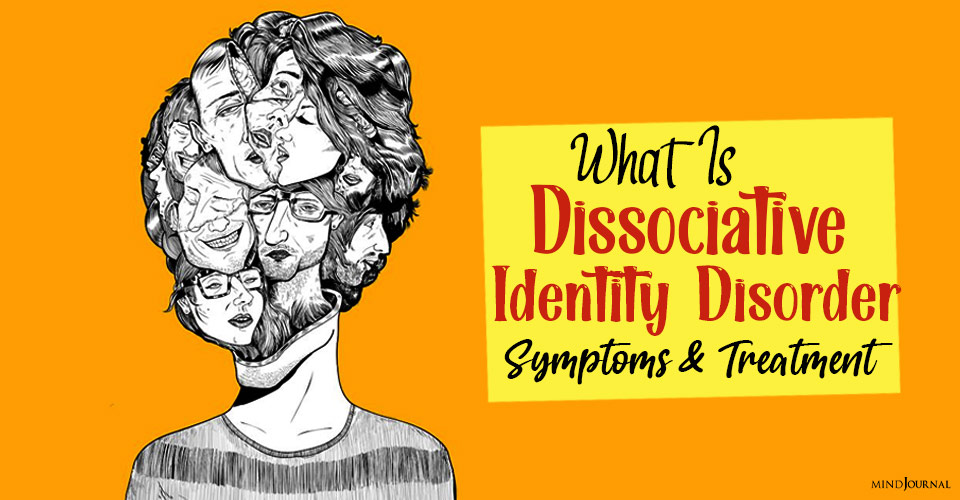Previously known as Multiple Personality Disorder (MPD), Dissociative Identity Disorder (DID) is a complex and rare mental illness of ‘multiple selves in a single body’. It is a psychological condition that involves the fragmentation of one’s identity, awareness, perception, and memory into different personality states known as ‘alters’.
What Is Dissociative Identity Disorder (DID)?
DID refers to a mental condition when a person develops two or more noticeable identities or personalities. The individual often has a main or primary personality along with one or more alternate personalities.
The primary identity of the person may be depressed, dependent or passive. The alternate personalities often ‘take control‘ of the individual and function with or without the main personality’s knowledge. Although the primary identity carries the given name of the person, it fails to incorporate different aspects of the individual into a multidimensional, yet single self.
The alternative personalities or identities referred to as alters, can be each experienced with a separate identity, self-image, and history when in control of the person. The name, gender, age, vocabulary and general knowledge of an alter may be completely different from the primary personality.
Moreover, the alters also show distinct characteristics, preferences, attitudes, behaviors, moods, mannerisms, and ways of talking. It is believed that these alternative personalities take turns to be in control of the individual.
However, when an ‘alter’ or even the main personality is not in charge, it completely detaches and dissociates. Hence, it can be completely unaware of the latest occurrences in the individual’s life.

Research has found that a specific ‘alter’ may be triggered to take control by certain stressors or circumstances. The different personalities may be unaware of the various alters and even the primary identity.
On the contrary, they may be fully aware of each other and criticize one another and even be in direct conflict. However, these alters are not fully developed or mature identities, but only a fraction of a disconnected personality.
Related: 5 Ways To Keep Yourself Calm During A Triggering Event
Understanding DID
Until 1994, dissociative identity disorder was known as multiple personality disorder (MPD). However, the name was modified to better understand the condition. It is a psychological process that leads to a dissociation between the memories, thoughts, actions, perceptions, awareness, and sense of identity of an individual.
This mental illness is a part of a group of conditions known as dissociative disorders. Dissociative symptoms can take place when multiple mental functions like consciousness & awareness, are disrupted.
Although these symptoms are usually mild, they can be severe as well and seriously interfere with the general functioning of a person, affecting their quality of life, both personal, social, and professional. In many countries and cultures, DID is often misidentified as supernatural possessions or possession states.
Causes Of Dissociative Identity Disorder
Individuals with this disorder are usually victims of severe and repetitive emotional, mental, physical, or sexual abuse and extreme trauma during early childhood. The disorder is believed to be a coping mechanism against the trauma.

The person develops alternate identities to dissociate the primary identity from their reality or experiences which may be too painful, traumatic, or violent for their conscious self to cope with. Hence, they shut themselves off through their alters.
Related: How To Heal From Childhood Trauma When Its Hampering Your Mental Health
However, studies have found that transition or “switch” to alternate personalities is “involuntary” and, usually the person with the disorder is “not aware of the transition or had any memory of the event.” This means that people with DID may not consciously develop alternate personalities.
Research also indicates that DID may be related to large-scale trauma as well, like natural disasters or war. It has been found that “familial, societal, and cultural factors may give rise to the trauma and/or they may influence the expression of DID.”
Dissociative identity disorder can also result from a sequence of various other factors as well. Studies have also suggested that DID may occur due to “significant disruptions to self-consciousness.” Confirmation of overlapping memories and abilities “supports the claim that DID results from internal conflict endured by a single self.”
Crucial Facts On DID
Due to a lack of adequate research on dissociative identity disorder, conclusive statistics are not readily available. However, available studies confirm the following facts regarding DID:
- According to NAMI (National Alliance on Mental Illness), research indicates that approximately 2% of the global population meet the full criteria for dissociative disorders.
- Around 75% of individuals have at least one episode of depersonalization/derealization experience during their lifetime.
- Women tend to be diagnosed more with a dissociative disorder than men.
- Around 7% of the population may experience DID, but they are left undiagnosed.
- Studies have found that DID can occur at any age, even during childhood.
- About 99% of people with dissociative disorders have experienced recurring abuse, traumas or life-threatening experiences during childhood.
- Dissociative identity disorder and substance abuse are directly related and drug abuse may adversely affect treatment. In fact, around 17.2% of an inpatient group receiving substance abuse treatment were diagnosed with DID.
- Misdiagnosis of DID is common as the symptoms of this mental illness are similar to other mental disorders.
- Patients with DID can have an average number of alters ranging from 2 to 10. However, the maximum recorded alters in one person was 100.
- The alters or alternate identities usually do not merge spontaneously.
- If left untreated, DID can lead to further abuse in the patient.
- Tendencies for self-harm and suicidal behavior are common among sufferers of DID. Over 70% of patients with DID have attempted suicide.
Read: How To Help A Person Who Is Feeling Suicidal
How DID Can Affect A Person
Dissociative identity disorder can significantly change how an individual lives their lives. Here are some of the common ways how this psychological process affects a person:
1. Depersonalization
The sufferer feels a recurring sensation of being outside their body. Similar to an out-of-body experience, they have a sense of getting detached from their own physical body.
2. Derealization
The person gets a strong feeling that their surroundings or even the world around them is not real. They believe that whatever is happening with them or around them is fake or imaginary.
3. Dissociative amnesia
The person experiences a deficit in memory or memory loss, which is not a result of a medical condition or injury. This is not similar to general forgetfulness.
4. Dissociative fugue
It is a certain episode of amnesia or memory loss. The person is unable to remember specific events or personal information for a period of time. They can also experience micro-amnesias and forget about a discussion or parts of a conversation immediately afterward. They may also detach from certain emotions.
5. Identity alteration/identity confusion
The person is generally confused about their own selves and their identity. They may suddenly become confused about their interests, career goals, sexual orientation, and perceptions about politics, religion, and society. They may also be confused about a particular situation, location and may even experience time distortions.
6. Blurred identity
The person feels like multiple people are living inside them or multiple voices talking inside their head. They might even feel that they have been ‘possessed’ by one or more entities or identities.
However, as per the Diagnostic and Statistical Manual of Mental Disorders (), some cultures around the world may not consider this as a dissociative disorder, as possession may be believed to be a spiritual or supernatural experience/ritual.
Symptoms Of Dissociative Identity Disorder
People with dissociative identity disorder show various noticeable symptoms when they switch between alters at different times.DID shares several symptoms found in other mental illnesses and disorders like trauma and PTSD. Some of the common symptoms of DID in adults include:
- Exhibition of multiple personalities or alters
- Feelings of dissociation & detachment
- Behavior inconsistent with character (primary identity)
- Anxiety, depression, panic attacks and mood swings
- Sense of lost time
- Confusion and disorientation
- Severe headaches
- Pain in different parts of the body
- Amnesia and gaps in memory
- Depersonalization
- Derealization
- Hallucinations & delusions
- Obsessive-compulsive symptoms
- Psychotic symptoms
- Different levels of functioning
- Changes in appetite and sleeping problems
- Out of body experiences
- Self-persecution and self-sabotage
- Issues with sexual performance
- Substance abuse
- Self-injury related behaviors
- Suicidal thoughts

However, the symptoms of DID may vary between adults and children. Symptoms of DID in children may include:
- Dissociating or becoming unresponsive (zoning out)
- Having recurring nightmares, frightening dreams & memories
- Triggering or mental distress to reminders of abuse & trauma
- Sudden physical reactions to memories related to trauma & abuse
- Sudden unexpected and unprecedented changes in appetite, preferences, interests & activities
Related: The Reason For Sudden Behavioral and Personality Changes in Kids
How DID Is Diagnosed
Diagnosis of dissociative identity disorder can be a complex and time-consuming procedure. DID is diagnosed in a very similar way as most other psychiatric diagnoses. The following criteria, laid down by the DSM-5, must be met by a person to be effectively diagnosed with this mental disorder:
- The person must exhibit two or more distinct alters or personality states or identities. Each alter must have their own separate pattern of “perceiving, relating to, and thinking about the environment and self.”
- The personality disruption should include a noticeable change in the sense of self and agency, along with changes in cognition, consciousness, memory, motor function, behavior and perception.
- The individual should be afflicted by the condition or experience difficulty in normal functioning is one or more crucial aspects of life, like social, personal or occupational, due to DID.
- The must experience amnesia and recurrent gaps in memory with an inability to recall daily events, personal information or even traumatic experiences of both recent & distant past.
- The experience or distress should not be a part or the religious or cultural practices, like spiritual possession.
- The symptoms of DID should not be due to the direct impact of substance abuse, like alcohol or drugs, or a medical condition.
Treatment Options For DID
Although there is no cure for dissociative identity disorder in the traditional sense, effective & dedicated treatment over a period of time can help the patient recover and get better. The objective of treatment is not to eliminate or get rid of the ‘alters’ or extra personalities, but to help the person identify the triggers for ‘switching’ and be prepared.
This will help them live harmoniously with all the personalities, including the primary one. A mental health professional with significant experience with dissociative disorders can help an individual to integrate separate personalities into a single identity.
Doctors usually take a multiple stage approach for the treatment of DID:
- Stage 1involves managing the symptoms and making the patient feel safe & secure.
- Stage 2 focuses on processing memories of abuse and trauma in a supportive & safe environment.
- Stage 3 focuses on integrating the different alters into a unified personality.
Effective treatment options for dissociative identity disorder include the following:
1. Psychotherapy
Also referred to as psychosocial therapy or talk therapy, psychotherapy involves speaking with a mental health professional about the details of the disorder. The therapist will try to understand the triggers and the different personalities. The goal is to combine the alters into one and reduce the impact of triggers.
2. Adjunctive therapy
Treatment options like creative, cognitive, or adjunctive therapies can also be helpful for DID patients. These can help the affected individuals to connect with different aspects of their identities and mind which they might have dissociated with or shut off to deal with trauma.
3. Hypnotherapy
Some experts also consider hypnosis to be an effective way to treat DID. When utilized along with psychotherapy, hypnotherapy or clinical hypnosis can allow a therapist to get access to repressed memories. It can also help in dealing with difficult behaviors and integrating all the alters into one.
4. Medications
Currently, no medications are available that can be specifically recommended for treating DID. However, a therapist might suggest some medications for associated and co-occurring mental disorders, like anxiety and depression. These medications are used along with psychotherapy.
Some commonly suggested medications to help psychological symptoms associated with DID are:
- Antidepressants
- Anti-anxiety drugs
- Antipsychotic medications
- Tranquilizers
Studies have found that effective treatment over a long period of time has been known to help people with DID. Treatment can significantly improve their functional ability in their personal and professional lives.
Related: 7 Ways to Know Therapy is Working for You

Live Unified
If you think you have some of the symptoms or if you know someone with dissociative identity disorder, then it may feel confusing and overwhelming. Movies & TV shows often wrongly portray individuals with DID as violent or evil. However, that is far from the truth and only leads to spreading myths and misconceptions about this mental disorder.
If you want to help a loved one with DID or seek help for yourself, start by educating yourself about this psychological illness. You should also make an appointment with a doctor and talk to them to get proper information. A mental health professional can not only help you get a better idea about DID but also help you or your loved one reduce its effect and improve their quality of life.












Leave a Reply